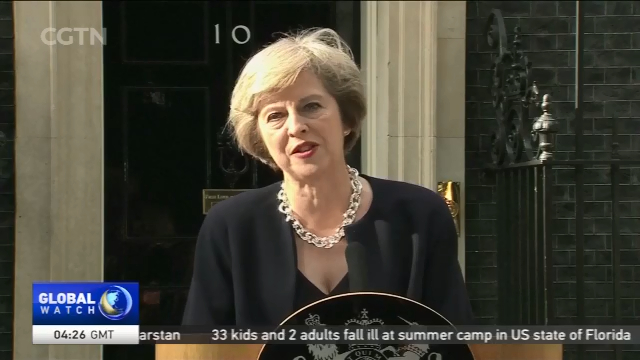
13:51, 23-Jun-2018
Brexit Two Years: Brits on how vote changed the way the world views the UK
02:53

Two years ago today the United Kingdom voted by a narrow margin to leave the European Union. In that time the country has seen a 20 percent crash in the value of the Pound Sterling, and economic growth has stalled. Richard Bestic reports now on the feelings of the British people two years after the vote which changed the way the world views the UK.
It was all so easy then for Britain's Brexiteers when the shock result tumbled there, they were catchphrases at the ready.
"We got our country back."
Such innocent times even the then newly installed UK Prime Minister Theresa May said Brexit would be a breeze.
"We will forge a bold new positive role for ourselves in the world."
The world, however, is still waiting two years on, according to economists.
PROF. JONATHAN PORTES KING'S COLLEGE LONDON "The cabinet still doesn't know what it wants, Parliament doesn't know what it wants and I don't think the British people know what they want. So we really haven't even started negotiating with the EU on what that long-term relationship could be. And it's quite amazing. I certainly wouldn't have predicted it."
Hurdles include Brexit's irresistible force meeting the invisible Irish border. And we've become instant experts in the EU's Customs Union a good thing – but it comes with strings attached which have the UK tied in knots. In Parliament, as elsewhere Brexit remains a hot topic of discussion but opinions are entrenched.
RICHARD BESTIC LONDON "Two years down the road and the Remain voters are edging ahead of those who want to leave the EU. The problem is most of those voters are young and it's an immovable law of politics that the young simply don't get out to vote."
So, even if Britain did it all over again, opinion polls suggest possibly the same result.
John Curtice one of Britain's leading political scientists says the country remains split down the middle from top to bottom.
PROF. JOHN CURTICE, POLITICAL SCIENTIST STRATHCLYDE UNIVERSITY "Public opinion has proved to be remarkably stable during this period, despite the arguments about what Brexit should mean and how the debate has gradually emerged and despite the fact that the public have indeed become increasingly pessimistic about what Brexit will actually deliver."
That pessimism reinforced this week with news from the airplane manufacturer Airbus that it would have to pull out of the UK if the government fails to secure a post-Brexit trade deal with the EU at a cost of 14,000 highly skilled jobs.
RICHARD BESTIC LONDON "They used to say in this country never talk about religion or politics it'll just cause upset. Well, guess what, now they've added Brexit to the list. RB CGTN London."

SITEMAP
Copyright © 2018 CGTN. Beijing ICP prepared NO.16065310-3
Copyright © 2018 CGTN. Beijing ICP prepared NO.16065310-3